Maximum material, maximum energy
Indaver is a supplier of high-quality materials and sustainable energy and aims to expand this role further. We are continuously looking for new and more efficient ways of recovering materials and energy.
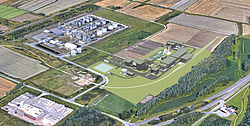
IndaChlor: sustainable solution for chlorine residues
In 2018, Indaver received the necessary licences for a new treatment facility in Loon-Plage, in the Port of Dunkirk, in France. This new facility has a 40,000 tonne capacity and will recycle chlorinated residues from the PVC industry to recover hydrochloric acid and energy. Hydrochloric acid is used in the chemical, petrochemical, metallurgy and food industries. We will supply recovered energy through a steam pipe to a neighbouring alcohol distillery.
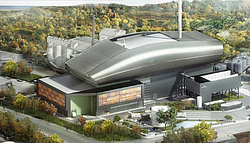
Aberdeen: new Energy from Waste facility
Aberdeen City, Aberdeenshire and Moray Councils in Scotland have joined forces to build an energy from waste facility that treats non-recyclable waste. Indaver is part of a consortium with Acciona, a Spanish multinational construction company, to carry out this project. The site has been designed to process 150,000 tonnes of municipal residual waste. It will create sufficient energy to supply heat for the proposed heating plan for the district of Aberdeen. It will also supply steam to the national electricity grid. Indaver will run and maintain the facility for 20 years. It must be fully operational by April 2022.
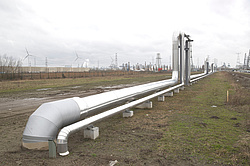
ECLUSE: reliable, affordable and sustainable energy for businesses.
In 2018, construction of the industrial steam network ECLUSE was completed in Antwerp’s Waasland port in Belgium. The network opened officially on 15 March 2019. ECLUSE sends the steam from Indaver's and SLECO’s waste-to-energy facilities through a network of pipes. Five companies purchase the steam. One company uses the condensate heat. These companies no longer need to make steam themselves in their steam boilers. Consequently, they can reduce their consumption of gas, a fossil fuel.
Indaver Molecule Management
Residual waste streams are increasingly seen as potential raw materials at a molecular level. As a company that handles around 5 million tons of waste products every year, Indaver knows what the valuable recoverable materials are. Our Indaver Molecule Management is intent on reintroducing materials from waste into the materials loop as much as possible. We examine the tiniest building-blocks – molecules – of the waste streams treated at Indaver to see which ones can be reused safely and effectively, with a quality that is no different from the original product.
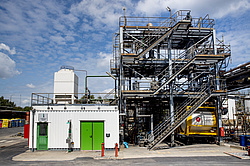
Indaver Metal Processing: precious metals from industrial waste
Precious metals are rare and valuable metals such as palladium. They are used as industrial catalysts. It is therefore ecologically and economically beneficial to recover these metals. Indaver does that with IndaMP (Indaver Metal Processing). This is a thermal process that separates the precious metals from solvents in pharmaceutical waste and collects them in the residues. We have converted an existing facility at our Antwerp site. So our customers have a constant and sustainable supply of precious metals. As a result, they are less dependent on raw materials from outside Europe.
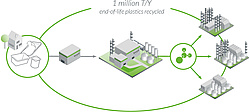
Plastics2chemicals: test facility fully under development
Working alongside Flemish universities, Indaver has been looking for a solution for hard-to-recycle plastic streams for a long time. Together with Ghent University, they have worked out an innovative process on a laboratory scale: plastics2chemicals. Plastics are broken down into smaller hydrocarbon chains. This produces a pure end product for the chemical industry. Indaver now wants to improve this solution on an industrial scale. For this, it is building a testing facility for 15,000 tonnes per year at its site in Antwerp. The licensing application is underway. In this facility, we will test the depolymerisation process in practice. In total, Indaver is planning ten facilities in Europe through which we will eventually be able to recycle 1 million tonnes of plastics.

Power-to-Methanol: sustainable methanol for Antwerp port
CO2 is released during thermal treatment at our facilities. In the Port of Antwerp, Belgium, we have started conducting a test to produce sustainable methanol from this CO2. Methanol is an important raw material for the chemical industry. Currently, this methanol is being produced using fossil raw materials. In this pilot project, the methanol is produced from collected CO2 and sustainably-generated hydrogen. This is done through a new process, Carbon Capture and Utilisation (CCU). For every tonne of methanol produced, the Port of Antwerp will avoid releasing one tonne of CO2 into the air. Thus making the Antwerp port more CO2 neutral.
